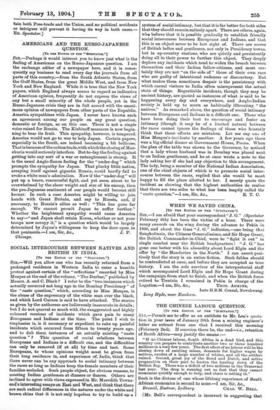AMERICANS AND THE RUSSO-JAPANESE QUESTION.
LT0 THE EDITOR OF THE "SPECTATOR."] lit,—Perhaps it would interest you to know juat what is the feeling of Americans on the Russo-Japanese question. I am the exchange editor of a newspaper here, and it is conse- quently my business to read every day the journals from all parts of this country,—from the South Atlantic States, from the Gulf States, from the great Middle West, and from New York and New England. While it is true that the New York papers, which England always seems to regard as indicative of American opinion, frequently do not express the views of any but a small minority of the whole people, yet in the Russo-Japanese crisis they are in full accord with the unani- mous opinion of newspapers from other parts of the Republic. America sympathises with Japan. I never have known such an agreement among our people on any great question, domestic or foreign, as on this one. There is not a single voice raised for Russia. The Kishineff massacre is now begin- ning to bear its fruit. This sympathy, however, is tempered. America would not go to war to help Japan. Certain papers, especially in the South, are indeed becoming a bit bellicose. That is because of the cotton trade,with which the closing of Man- churia would seriously interfere. But to-day the feeling against getting into any sort of a war or entanglement is strong. It is the usual Anglo-Saxon feeling for the " under-dog " which prompts the sympathy for Japan. That plucky little nation, arraying itself against gigantic Russia, could hardly fail to evoke a white man's admiration. Now if the "under-dog" will put up a brave, resourceful fight, and yet seem about to be overwhelmed by the sheer weight and size of his enemy, then the pro-Japanese sentiment of our people would become still keener. In such a case America might be willing to join hands with Great Britain, and say to Russia, and, if necessary, to Russia's allies as well : "This has gone far enough. We cannot permit Japan to suffer further." Whether the heightened sympathy would cause America to say—" and Japan shall retain Korea, whether or not your troops now occupy it," is a question which would be largely determined by Japan's willingness to keep the door open in
that peninsula.—I am, Sir, &c., J. P. Chicago.






































 Previous page
Previous page